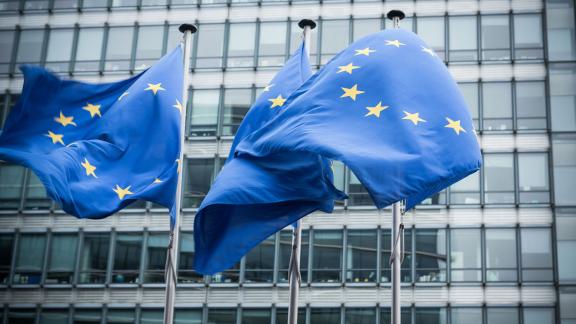Horizon 2020

Horizon 2020 will see the EU contribute over €70 billion over a seven-year period to support the EU’s position as a world leader in science, help secure industrial leadership in innovation, and help address major concerns shared by all Europeans (societal challenges).
The latter societal challenges cover six key themes, including; health, demographic change and well-being; food security, sustainable agriculture, marine and maritime research and the bio-economy; secure, clean and efficient energy; smart, green and integrated transport; climate action, resource efficiency and raw materials; and inclusive, innovative and secure societies.
2018-2020 funding ‘Health Demographic Change and Wellbeing’
The European Commission has published all the topics to be funded from 2018 to 2020 by Horizon 2020. Under the area of "Health, Demographic Change and Wellbeing", the overall budget for the coming three years will be just over €2bn. As part of this total funding commitment, the European Commission will open 48 public calls for proposals predominately for collaborative research. You can consult the calls for proposals here.
The priorities of the 2018-2020 work programme are as follows:
- Better health and care, economic growth and sustainable healthcare systems. Topics for this are grouped under the following themes:
- Personalised medicine
- Innovative health and care industry
- Infectious diseases and improving global health
- Innovative health and care systems: integration of care
- Decoding the role of the environment, including climate change, for health and wellbeing
- Digital transformation in health and care
- Trusted digital solutions and cybersecurity in health and care
In addition to the work programme, one of the most important reference documents for those intending to bid for EU funds is the annotated model grant agreement. This document explains in detail the legal and financial aspects of a grant and the requirements necessary when taking part in EU grants. You can find the document here.
What will be the impact of Brexit on EU grants for NHS organisations currently involved in EU funding bids?
Latest UK Government update on UK participation in Horizon 2020 (March 2018)
The update includes an overview with Q&A and is published by the Department for Business, Energy and Industrial Strategy.
The main messages are that:
- Until our departure from the EU, we remain a Member State, with all the rights and obligations that entails. This means that UK entities are eligible to participate in all aspects of the Horizon 2020 programme while we remain a member of the EU.
- The UK and the EU fully intend UK entities’ eligibility in Horizon 2020 to remain unchanged for the duration of the programme, as set out in the Joint Report. This includes eligibility to participate in all Horizon 2020 projects and to receive Horizon 2020 funding for the lifetime of projects.
- The Government’s underwriting guarantee remains in place in the event that commitments made in the Joint Report are not met.
UK participants are therefore encouraged to continue applying for Horizon 2020 funding and participating in Horizon 2020 projects and to reassure their international partners about their capacity to fulfil the roles and assume the involvement which best fit proposed projects.
Mid-term review of Horizon 2020
The European Commission has issued its mid-term review of the Horizon 2020 programme, saying that it is on track to meet the programmes’ objectives. This includes the objectives of the ‘health, demographic change and wellbeing’ challenge. The EU rapid response to health threats such as Ebola and Zika were cited as evidence that the programme is flexible enough to meet urgent new needs.
The fight against anti-microbial resistance was also cited, and has received over the years more than €1bn of investment from the European Commission.
The health programme is one of the most attractive parts of H2020, receiving a large number of proposals. Horizon 2020 succeeds in attracting and involving the EU's and world's best research institutions and researchers.
A major investment, close to EUR 900 million, has been made from FP7 and Horizon 2020 to 164 collaborative projects related to rare diseases. The results of the EU-funded projects bring new knowledge to the understanding of the epidemiology, pathophysiology and natural history of rare diseases and bring forward the translation of the results into the development of new diagnostic tools and therapies for rare diseases. Concrete benefits for healthcare have been delivered in terms of clinical guidelines for the diagnosis and treatment for rare diseases. Projects also provide tools for effective and ethical sharing of research and medical data, as well as insights into new methodologies for clinical trials in small populations and health technology assessment, and thus strengthen the evidence base for future policy decisions regarding the regulatory pathway and access to new interventions.
One of the main challenges highlighted by the review is that Horizon 2020 suffers from under-funding, resulting in large-scale oversubscription, much larger than in FP7, which constitutes a waste of resources for applicants and of good proposals for Europe. Read the review.
A high level group, chaired by Pascal Lamy, has produced a report on maximising the impact of EU research and innovation programmes, which will guide the European Commission as they design Framework Programme 9 (follow-up programme to H2020).
EU Knowledge Innovation Community on Healthy Ageing (KIC)
Horizon 2020 also funds other programmes of interest to the NHS. One such initiative is the EU Knowledge Innovation Community on Healthy Ageing (KIC). The successful Health KIC is called InnoLife and has direct involvement from the Oxford, West Mids, Imperial Health Partners and North West Coast AHSNs, along with dozens of other public and private partners from the UK and across Europe.
The KICs bring together leading universities, research labs and companies to form cross-border partnerships that develop innovative products and services, start new companies, and train a new genre of entrepreneurs. We currently have KICs in Climate Change, ICT, and Sustainable Energy, and the advent of one in Health is seen as a significant advancement of the innovation agenda at EU level.
The Health KIC aims to overcome the fragmentation of different healthcare systems in Europe and give companies easier access to markets across the EU. As an example of its product, by 2018 the Health KIC aims on an annual basis to create 70 start-ups and have 1million students participating in their educational on-line programmes. It is likely to receive around €540M EU funding in total by 2022, to be shared amongst the partners.
Horizon 2020's other links
The overall budget for Horizon 2020 will also support other funding programmes of interest to the NHS. In particular, it will help fund:
- the Innovative Medicines Initiative (IMI)
- the Active and Assisted Living Joint Programme (AALJP)
- Marie Curie Actions
View the individual websites to find out about these funding programmes.



